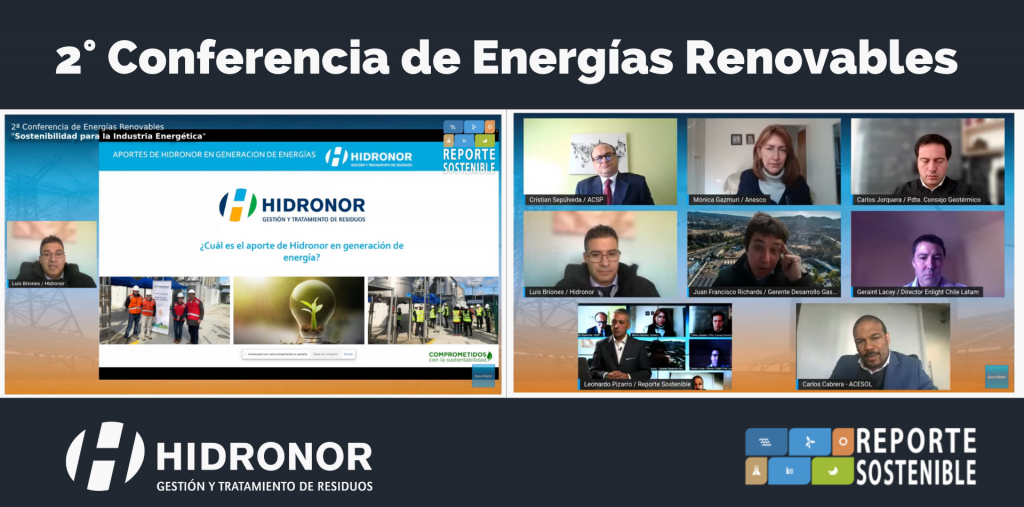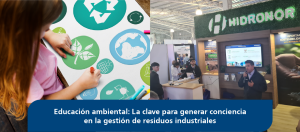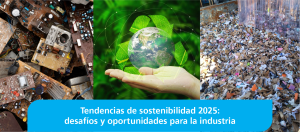
Recent years have put a firm foot on the gas for the widespread use of non-conventional renewable energy (NCRE) in industrial projects in our country. This, as a product of the environmental benefits that Chile relies on to generate this resource, in addition to the benefits that its use provides to reduce the effects of climate change which is largely due to the use of fossil fuels as energy sources. This panorama has led environmental organizations to establish somewhat ambitious goals, by 2050 for example, 96% of our energy matrix should come from renewable sources.
To delve into this topic and talk about the current and future panorama, regulations, projects in development and the ones to come, and how NCRE generating companies can take care of the industrial waste they generate, on May 30th the 2nd Renewable Energy Conference: "Sustainability for the Energy Industry" was held, organized by Sustainable Report and with the support of the Ministry of Energy, in addition to different companies associated with the field, among which Hidronor Chile participated.
The conferences were focused on providing updated information on the different sustainable energy sources in Chile, in addition to info on geothermal development and photovoltaic plants in the context of the transition that our country is going through to achieve the stipulated goals; but all these projects, besides their intrinsic relationship to renewable energy, have a common point also vitally important to highlight and that is, despite providing sustainability to the ecosystem, like many other companies, clean energy generating plants do not escape the generation of industrial waste during its construction and operation stage.
To talk about how NCRE generating plants can take care of this waste responsibly, for their production processes to reach the highest levels of sustainability, Luis Briones, specialist in the Development of Services at Hidronor Zona Norte, explained all those present the contribution of Hidronor Chile in this matter, in addition to some figures, current panorama of energy projects in operation and challenges to come.
During the meeting, Luis explained that given the processes these plants carry out, they produce waste that is flammable, toxic, reactive, corrosive, scrap, wastewater among others, even though not all of them have dangerous levels, these must be managed correctly to comply with the provisions of the current legislation, and it is precisely at this point where Hidronor has positioned itself as a strategic environmental partner for the main generators of clean energy in the country, standing out as one of the companies with the greatest service capacity at a national global level.
"We provide a wide range of solutions associated with the management, treatment and safe disposal of hazardous and non-hazardous industrial waste, in addition to the recycling and revaluation of waste, as for example residual oils that are generated nationally to produce alternative fuel that is then used by other industries –like cement factories–, along with used batteries which can be used to manufacture new units or their materials can be used as raw material for other processes, reinserting them into the production and consumption chain, thus contributing to the economy circular. In addition, we energetically value the biogas extracted from the sanitary landfill that we have in the southern part of the country, injecting it as clean energy into the national distribution network”, highlighted the executive.
Likewise, "we also offer the possibility of carrying-out the industrial cleaning of the containers used in the processes so these can be reused up to six times before being disposed of safely, with which we contribute to the reduction of the material that finally ends up in security deposits,” he added.
Nonetheless, Luis highlighted the company's ability to present services in remote places, with difficult access, with little communication and with changing needs, which represents great challenges, "and this is where we play a fundamental role for our clients, as we have been able to fully comply with the different requirements in different areas of the country”, he concluded.
The event, which included the participation of more than 100 connected people, culminated with an interactive panel where those present were able to clarify several of their doubts with the exhibitors, and were invited to a second day of talks held on Tuesday, May 31, where different exhibitors discussed topics such as renewable energy and its storage in the country, marine energy, the role of bioenergy in the energy transition, among other topics of interest.
We invite you to review the full presentation on our YouTube channel







